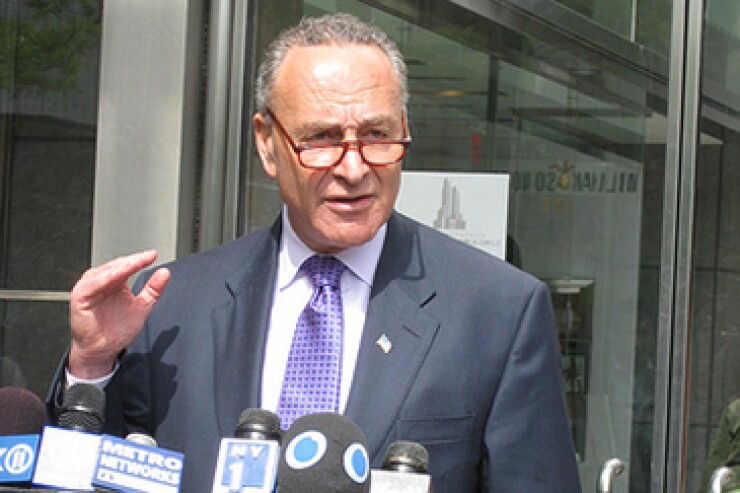WASHINGTON – The Senate voted 79 to 18 on Thursday to approve the more than $1 trillion omnibus spending bill for fiscal 2017 that ignores most of President Trump’s proposed cuts to programs, some of which provide grants used in conjunction with tax-exempt bonds.
The bill must now be signed by Trump before midnight Friday to avoid a government shutdown, when the latest extension of the continuing resolution will expire. The House already passed the bill, which will fund federal programs through Sept. 30, by a vote of 309 to 118 on Wednesday.
“The bill is the result of weeks and weeks of bipartisan, bicameral negotiations and the final product reflects the give-and-take of those negotiations,” Senate Minority Leader Chuck Schumer, D-N.Y., said before the Senate vote. “It’s proof to many that Washington can work when we work together.”

President Trump, in late March, sought almost $18 billion more in spending cuts for fiscal 2017 to offset increases in defense spending and would have eliminated funding for the popular Transportation Investment Generating Economic Recovery (TIGER) grant program and cut many other programs.
But the omnibus bill includes $500 million for the TIGER program, $43.2 billion for the federal highway aid program, and $12 billion for transit. Rail projects with signed agreements for full-funded New Starts grants with the Federal Transit Authority will received $1.5 billion and $285 million has been set aside for projects expected to enter into full-funding agreements this year, including $125 million for the Purple Line in Maryland.
The bill will increase federal highway and public transportation funding by $1.3 billion more than in fiscal 2016, according to Dave Bauer, senior vice president for government relations at the American Road & Transportation Builders Association.
“The programs have been operating under a series of short-term extensions that have maintained last year’s funding levels since fiscal 2017 began,” Bauer said. “The increased resources will be deployed during the final five months of the fiscal year ending Sept. 30.”
The budget also provides a total of $12.4 billion for the public transportation program, a boost of $400 million from the funding in the FAST Act, he said. The additional funding includes a $223 million increase for the Federal Transit Administration’s Capital Investment Grants, which supports transit projects.
The American Association of Port Authorities said it is encouraged by the increased funding for water transportation infrastructure in the new budget.
“The funding levels in this legislation will benefit U.S. ports by ensuring the federal government continues to contribute its share of capital to seaport-related infrastructure,” said Kurt J. Nagle, AAPA’s CEO.
Overall funding for the U.S. Army Corps of Engineers totals $6 billion in fiscal 2017, almost $1.5 billion more than President Trump requested and $49 million more than in fiscal 2016. The agreement also includes $2.7 billion for navigation projects and studies, and $1.3 billion for port projects from the Harbor Maintenance Trust Fund.
The Community Development Block Grant program will receive $3 billion and clean water and drinking water state revolving funds will receive $2.3 billion, under the omnibus measure . The Water Infrastructure Finance and Innovation (WIFIA) will get an additional $10 billion.
Puerto Rico will get $295.9 million for its Medicaid program under the bill, as the Commonwealth heads into a bankruptcy-like restructuring of its debt under PROMESA.





